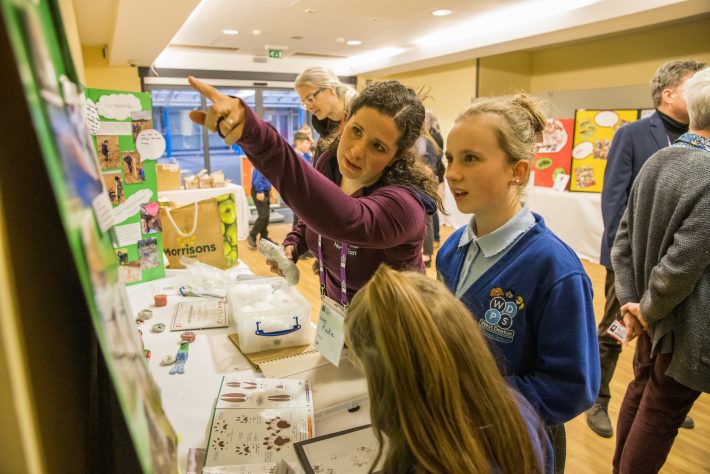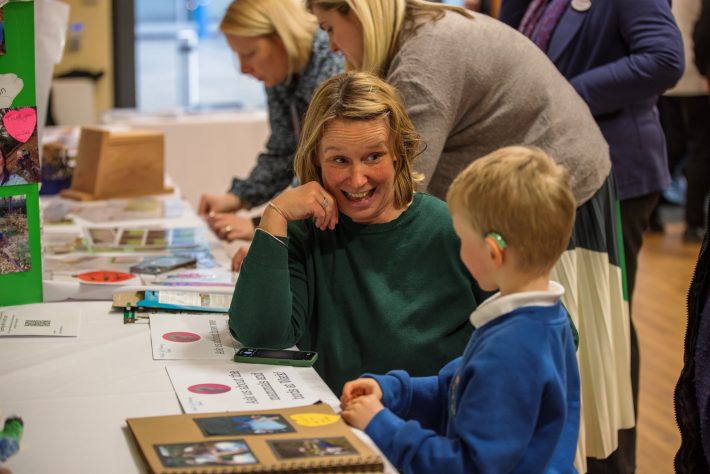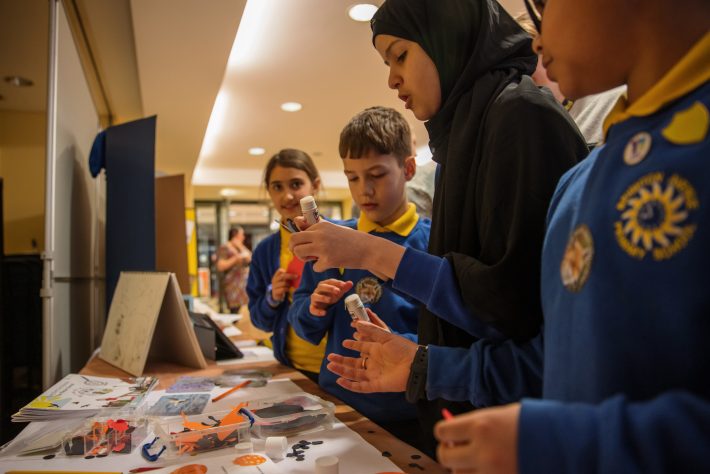Schools across the North East recognised for their commitment to welcoming nature into school grounds
On the 14th March 2023 the British Ecological Society celebrated the resounding success of their ‘Connecting Schools to Nature’ project which has seen over 5,000 primary school children introduced to nature within their school grounds.

This 18-month British Ecological Society project saw green transformations delivered in 72 schools in disadvantaged and isolated areas of the North-East of England, while upskilling teachers, volunteers and staff with the skills they need to spark ecological inspiration in the next generation.
The celebration event, hosted at the Hancock Museum in Newcastle, brought together teachers, volunteers, children and representatives of the project’s team and partners to share the impact of the project and highlight some of the inspiring stories from the past year.
The event featured opportunities to show off how pupils made the green transformations at their school unique to them, discuss the obstacles teachers and schools face reconnecting with nature directly on school grounds and honour the achievements of all involved.
Professor Zenobia Lewis, Chair of the BES Education and Careers Committee said: “The project has been a resounding success – the children were inspired, the teachers now feel more confident teaching about the environment, and, perhaps most importantly, great fun was had by all.”
This celebratory event also saw the official launch of the new BES Encounters platform – an interactive digital learning portal that allows children and teachers to track their nature friendly achievements and aid learning.
A project championed by teachers
Participating schools from County Durham, Newcastle, North Yorkshire, and the Scottish borders have been opening their doors to nature through wildlife-friendly activities such as creating wildflower meadows and installing camera traps which let the children discover the wildlife in their schools.

As a result of these activities, 100% of teachers agreed that their students’ connection to and knowledge of nature has improved, and 76% of teachers agreed that their students’ wellbeing had improved whilst participating in the project.
Speaking at the celebratory event, Rebecca Aspinall, a teacher from Nettlesworth school said: “Our children now have the skills they need to truly appreciate and engage with their environment.
“The connecting schools to nature in North East England project has encouraged the children to stop and look at what’s around them in their environment and school grounds. Pupils have been encouraged to think not only about nature already present in the school grounds, but the opportunities for nature that could be there too.”
Wark Church of England Primary School, Brighton Avenue, West Denton, Dunn Street, Laurel Avenue and Nettlesworth schools attended the event, and were celebrated for their commitment to all aspects of the project and the breadth of activities they took part in. Activities included:
- Running litter picking campaigns and constructing hedgehog artwork made from recycled materials.
- Making contributions to citizen science projects through their camera trapping, bird watching and other forest school activities.
- Constructing bird feeders and partaking in other nature based activities such as making stick art works, writing creative poems and building bird clay models.
A lasting impact on schools, volunteers, and the community
The BES has also provided ecology training to teachers across the region through delivering workshops across the partner schools. As well as upskilling >70 volunteers who have been assisting teachers to deliver biodiversity enhancements to school grounds.
As a direct result of the project, 56% of teachers reported that they enjoy their day-to-day teaching more, and 52% feel that their wellbeing has improved – a positive result in a profession known for its stressful nature.

Sammy Mason, Outreach Project Officer at the BES, remarked on the lasting legacy this project will have not only on school grounds but on the careers and futures of those involved.
“Helping to develop the environmental educators of tomorrow is such an exciting prospect, and vital as we emerge from a pandemic. This project is helping scores of ecologists and educators bridge the Covid skills gap, supporting young individuals as they enter the job market and pursue diverse career paths within the environmental sciences.”
Tom Williams, who volunteered for this project while they were a student at Durham University said: “It has been great to see how enthusiastic the children were given the chance to reconnect with nature.
“Being involved in the BES’s project has given me the opportunity to develop communication skills I hope to carry into my future career while helping to inspire younger generations and explain the power of the world around them.”
Professor Karen O’Brien, Vice-Chancellor and Warden at Durham University, said: It’s wonderful to celebrate the work of the British Ecological Society and our MammalWeb project in actively involving schoolchildren in ecology and biodiversity for the long-term benefit of communities across the North East.”
“Durham University’s aim is to deliver excellence in education, research and wider student experience in the most sustainable way possible, and biodiversity is key to this. We’re working to enhance both the University and Durham City as a place where wildlife can thrive and everyone can live, study and work in a healthy environment.”
To get involved with the project, sign up to the BES Encounters platform and welcome nature into your school grounds.
We are now planning for the future to ensure a lasting legacy for the project and resources developed. We are keen to discuss the project findings further and explore potential opportunities for collaboration.

The ‘Connecting Schools to Nature in North East England’ project is funded by a £248,700 grant provided by the Government’s Green Recovery Challenge Fund. The fund was developed by Defra and its Arm’s-Length Bodies. It is being delivered by The National Lottery Heritage Fund in partnership with Natural England, the Environment Agency and Forestry Commission.
To enhance the impact of the project, the County Durham Community Foundation and Banks Community Fund awarded the BES vital funds to support the green transformation of primary schools in Durham and surrounding villages.
Like what we stand for?
Support our mission and help develop the next generation of ecologists by donating to the British Ecological Society.